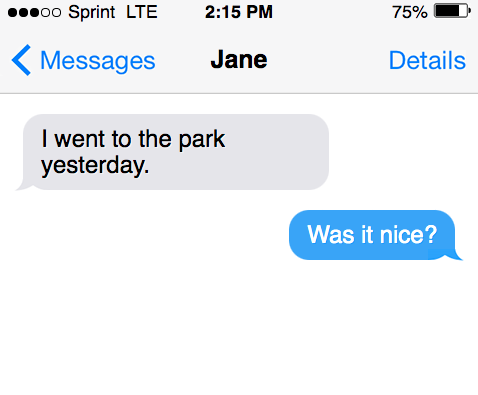What is the past participle of “go?” A past participle in English is a form of a verb, typically ending in the letters “ed.” It describes various tenses—usually, perfect continuous tense and passive tense.
Learn what the past participle of the word “go” is…
What does the word “go” mean?
The word “go” means to “move from one place to another; travel,” according to Dictionary.com. The verb forms typically mean to “leave a place; depart.”
Think of these synonyms:
- Walk
- Run
- Travel
- Advance
What is a past participle?
In English, a participle and past participle refer to an action that was started and completed in the past. It is the third participle part of the verb. It is typically created by adding the letters “ed” at the end of a base form.
The verb is typically used with an auxiliary (or “helping”) verb. For example, the verb forms “has,” “have,” or “had.” These express the perfect aspect. Or a verb construction denotes events that occurred in the past (linked to a later time).

Typically, the perfect aspect (or present tense) and past participle form can get used in a passive voice or as an adjective.
Past participle examples
Here are common examples of past participles:
- Jump = Jumped
- Sleep = Slept
- Touch = Touched
What is a present perfect continuous tense verb?
A present perfect continuous tense (also referred to as “present perfect progressive tense”) shows that something started in the past and is continuing at the present time.
Typically, the root word plus “ing” is at the end. For example, “Mia has been competing in cheerleading for more than six years.”
These forms are used to convey an action or activity that began in the past and is not yet finished.
What are irregular verbs?
What are irregular verbs? An irregular verb is similar to a participle form. They typically end in -d, -t, and -n. Example words would be “said,” “slept, “broken.”
Typically, they must proceed with an auxiliary verb to form a past participle of irregular verbs.
For example, “Blow or ‘has blown, have blown.'”
Common irregular verbs:
- Fly or Flew (to have flown)
- Rise or Rose (to have risen)
- Feel or Felt (to have felt)
- Bite or Bit (to have been bitten)
- Drive or Drive (to have driven)
What is the past participle of the word “go?”
“Go” is an irregular verb. And to make it into its past tense form, we reduce it back to the root word(s), “gone” or “went.”
The present participle form of the word “go” is “going.”

What is the future continuous tense of the word “go?”
The future continuous tense version of the word “go” is “going.”
This refers to something that is happening in a future state rather than the past or present. Refer to the past perfect continuous tense forms and past participle forms above.
How to understand which form to use
When wanting to describe something that occurred in the past and is continuing at the present time, we would use the present participle form, “going.” This is the simple past tense version of the word “go.”
For example, “John is going to the baseball game.”
If referring to something in the future continuous tense for the word “go,” we use “going.”
For example, “I’m going to California at the end of the school year.”
And lastly, when we refer to the past participle form of the word “go,” we use “gone” or “went.”
For example, “I’ve gone to the baseball game more times than I can count!”
English verbs can be highly confusing when compared to other languages.
How to remember which form to use
Here’s an easy trick to remember which form to use:
- Going: Remember the idiom/phrase, “going, going, gone.” This is something that is going to happen in the future. A future state. For example, a new job. “I am going to start a new job in the summer.” The word “going” is often paired with an infinitive verb like “to.”
- Went/Gone: Remember the phrase, “I went to the bathroom.” The phrase refers to something that occurred in the past. Instead, the past tense of “go.”
- Goes: Less common than “gone/went/going,” remember the phrase, “The merry-go-round goes round and round.” This is the third-person singular tense of the word “go.” Additionally, it is the plural for the word “go.”
Different tenses can be challenging to remember. An easy trick to recall which tense to use is to describe things as part of a day.
For example, did they happen earlier in the day? Are they happening now? Or will they happen?
Read this discussion for an easy way to remember auxiliaries in American English.
Common questions
Questions and answers about the English language.
What is the conjugation of the verb “go?”
The conjugation of the word “go” is “to.” For example, “To go to the baseball game.”
What is the third-person singular simple present indicative form of the word “go?”
“Goes” is the third-person singular simple present indicative form of the word “go.”
Sources
- Auxiliary Verbs: Explanation and Examples – Grammar Monster
- Passive Voice – UNC Writing Center
- Present Perfect Continuous Tense | Grammar – EnglishClub
- Present Perfect Continuous Tense | ENGLISH PAGE
- What Is a Conjugated Verb? – English Grammar Rules & Usage
- Verb Tenses—–How to Use Them Correctly – Grammarly
Inside this article
Fact checked:
Content is rigorously reviewed by a team of qualified and experienced fact checkers. Fact checkers review articles for factual accuracy, relevance, and timeliness. Learn more.
Core lessons
Glossary
- Abstract Noun
- Accusative Case
- Anecdote
- Antonym
- Active Sentence
- Adverb
- Adjective
- Allegory
- Alliteration
- Adjective Clause
- Adjective Phrase
- Ampersand
- Anastrophe
- Adverbial Clause
- Appositive Phrase
- Clause
- Compound Adjective
- Complex Sentence
- Compound Words
- Compound Predicate
- Common Noun
- Comparative Adjective
- Comparative and Superlative
- Compound Noun
- Compound Subject
- Compound Sentence
- Copular Verb
- Collective Noun
- Colloquialism
- Conciseness
- Consonance
- Conditional
- Concrete Noun
- Conjunction
- Conjugation
- Conditional Sentence
- Comma Splice
- Correlative Conjunction
- Coordinating Conjunction
- Coordinate Adjective
- Cumulative Adjective
- Dative Case
- Determiner
- Declarative Sentence
- Declarative Statement
- Direct Object Pronoun
- Direct Object
- Diction
- Diphthong
- Dangling Modifier
- Demonstrative Pronoun
- Demonstrative Adjective
- Direct Characterization
- Definite Article
- Doublespeak
- False Dilemma Fallacy
- Future Perfect Progressive
- Future Simple
- Future Perfect Continuous
- Future Perfect
- First Conditional
- Irregular Adjective
- Irregular Verb
- Imperative Sentence
- Indefinite Article
- Intransitive Verb
- Introductory Phrase
- Indefinite Pronoun
- Indirect Characterization
- Interrogative Sentence
- Intensive Pronoun
- Inanimate Object
- Indefinite Tense
- Infinitive Phrase
- Interjection
- Intensifier
- Infinitive
- Indicative Mood
- Participle
- Parallelism
- Prepositional Phrase
- Past Simple Tense
- Past Continuous Tense
- Past Perfect Tense
- Past Progressive Tense
- Present Simple Tense
- Present Perfect Tense
- Personal Pronoun
- Personification
- Persuasive Writing
- Parallel Structure
- Phrasal Verb
- Predicate Adjective
- Predicate Nominative
- Phonetic Language
- Plural Noun
- Punctuation
- Punctuation Marks
- Preposition
- Preposition of Place
- Parts of Speech
- Possessive Adjective
- Possessive Determiner
- Possessive Case
- Possessive Noun
- Proper Adjective
- Proper Noun
- Present Participle
- Prefix
- Predicate



